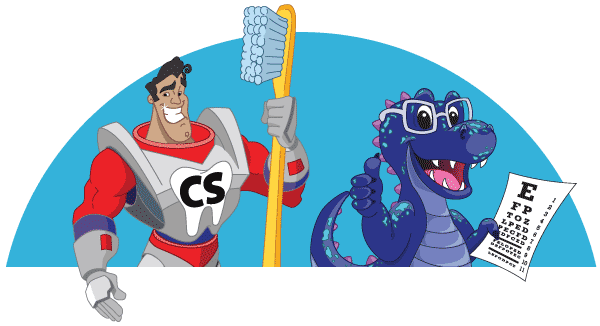Vision
Does My Child Need Eyeglasses?

Knowing if a child needs glasses isn’t as simple as knowing if an adult needs glasses. Children don’t necessarily know if they’re having vision problems.
For this reason, the best way to know if your child needs eyeglasses is an eye exam. And, since children’s eyes and vision are developing and changing, an annual eye exam is important to be sure your child’s vision is healthy.
Since children often can’t tell you if their vision needs correction, knowing the symptoms of vision problems is important. Often, parents have to pay attention to symptoms like the ones below. These are clues to help you catch a vision problem in your child—and help him or her have the healthiest vision possible.
Symptoms to look for to know if your child needs glasses
Headaches
Often children with vision problems will have frequent headaches in the front or brow region of the head. This is a symptom of farsightedness (being able to see distant objects clearly, while nearby objects are blurry).
Sitting close to the TV or computer
If your child has a habit of sitting very close to the TV or computer, he or she may be nearsighted (able to see nearby objects clearly, while objects that are far away appear blurry). If you notice this as a habit for your child, consult an optometrist.
Squinting
For nearsighted children—and adults—squinting can help make far away objects that are blurry appear clearer. So, one symptom of nearsightedness in children is squinting.For school-aged children, uncorrected nearsightedness can negatively impact school performance and grades. If your child squints, it is important to get an eye exam from an optometrist.
Reading problems, including losing place while reading
Young readers’ success can be impacted by vision problems. If your child avoids reading, has trouble reading—or other “close up” activities, your child may have vision problems and should have an eye exam.
And, if your child frequently skips lines or loses his or her place while reading, this could be a symptom of treatable eye muscle problems. Consult an optometrist to learn more.
Eye rubbing
Eye rubbing does not necessarily mean your child is tired. Eye rubbing indicates eye fatigue or strain that may require vision correction. If your child is frequently rubbing his or her eyes, consult an optometrist to ensure any vision problems are addressed.
Clumsiness
Tripping or bumping into things doesn’t necessarily mean your child is clumsy. If your child is tripping or bumping into things or corners, it could be a symptom of vision problems.
Eye exam recommendations
School vision exams only screen for a fraction of vision problems. The American Optometric Association (AOA) recommends the first eye exam at six months. Then, children should have an eye exam at ages three and five. Once your child is school aged, exams every other year are recommended if your child does not require vision correction. If your child requires vision correct, annual eye exams are recommended.
Find an optometrist near you. Knowing if a child needs glasses isn’t as simple as knowing if an adult needs glasses. Children don’t necessarily know if they’re having vision problems.
